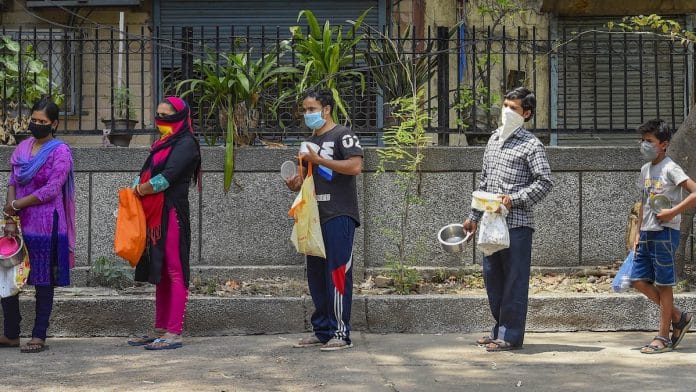New Delhi: Delhi Chief Minister Arvind Kejriwal has announced that his Aam Aadmi Party (AAP) government will provide rations to 1 crore people in the national capital amid the lockdown to fight Covid-19 but the ground situation appears to be different.
According to a officials operating a lockdown helpline started by the Delhi Commission for Protection of Child Rights (DCPCR) for parents and children two weeks ago, a large number of the calls and concerns have been about the unavailability of rations.
The helpline received 24,658 calls between 7 April and 21 April, a DCPCR report has stated. Of these, 30 per cent or around 7,397 pertained to rations and SOS requests regarding medicines, food and other essentials. The data also shows that 24 per cent of the callers (5,918 calls), particularly children, were worried about boredom. Another 23 per cent, or 5,671 calls, were regarding depression and anxiety.
The helpline — 011-41182977 — was launched on 7 April and will operate until 30 April unless there is a need to continue services beyond that, officials told ThePrint.
Also read: Plasma therapy on Delhi Covid-19 patients yields positive results, say Kejriwal & top doctor
Women form majority of the callers
According to the data, 59.4 per cent of the callers were parents, while 36.4 per cent were children or those below 18 years of age. Two per cent of the calls were from migrants while the remaining two per cent is scattered across categories such as senior citizens and anonymous callers.
Among the adults, 64 per cent of the callers were women. The report says that parents, mothers in particular, called the helpline worried about their inability to access rations, failure to get e-passes made, or simply the unavailability of food at government shelters.
Pregnant women in distress have also called on the number, DCPCR member Anurag Kundu told ThePrint. “A seven-months pregnant woman in Sangam Vihar was hungry and also needed medicines but was alone. Local volunteers were contacted and she was provided with fruits, medicines and rations,” Kundu said.
Asked why rations continued to be a concern, Delhi Women and Child Welfare Minister Rajendra Pal Gautum said the government’s efforts to ensure access to everyone were still underway. “The efforts have been on. Around 70 lakh people are being provided rations through the government’s schemes anyway, and another 30 lakh through e-coupons being distributed by MPs/MLAs.”
For the callers who complain they have been left out, he added, counsellors take down their details and send them kits.
Also read: No salary for months, Delhi municipal staff’s struggles have multiplied in Covid lockdown
DCPCR launches aid programme
Taking cognisance of the concerns about rations, the DCPCR has now started a programme to help children whose parents have lost work during the nationwide lockdown.
As part of its ‘Delhi Against Malnutrition’ campaign, the commission is now providing support to children up to the age of six from families of out-of-work daily-wage labourers.
In 2019, the DCPCR had identified over 70,000 street children, most of whom were either found engaged as labourers at factories and stalls or found begging or indulging in substance abuse.
The DCPCR, officials said, has now joined hands with the Centre for Advocacy and Research (CFAR), an NGO that works with marginalised communities, to distribute milk packets to these children on a daily basis.
DCPCR member Ranjana Prasad said the commission had curated a list of food items for children based on nutritional values for each product and suggested that they be distributed through anganwadi and food distribution centres.
Also read: No gadgets, no studies: What online classes mean for 16 lakh poor students in Delhi schools
The Delhi helpline
The DCPCR has employed 60 counsellors to take the calls in collaboration with the Delhi education department. Around 20 counsellors work in shifts of three to three-and-a-half hours at a time. The helpline operates from 10 am to 7 pm.
Counsellors whom ThePrint spoke to said a lot of the anxiety complaints centred on the unavailability of proper food or disruption in schooling.
Kundu said a lot of the complaints also had to do with callers not knowing what to do with one’s free time or the uncertainty about the future. Around 17 per cent of the callers also expressed financial anxiety due to unemployment or lack of money.
Asked about the report, Indu Prakash, a member of the Supreme Court-appointed committee on homeless shelters in Delhi, said even she had received “calls from homeless people in need of help”. “The police and the Delhi administration have stepped in now to ensure that the destitute people are taken to shelter homes,” she added. While there is a gap between the initiatives announced and the delivery, she said, “The problem is large and hence I am not sure if we can only blame the government. The poor are scared of police personnel coming their way when they step out and we have to ensure help reaches them.”
Also read: Pregnancy in a pandemic — lockdown triggers anxiety, doctors advise patience and caution






